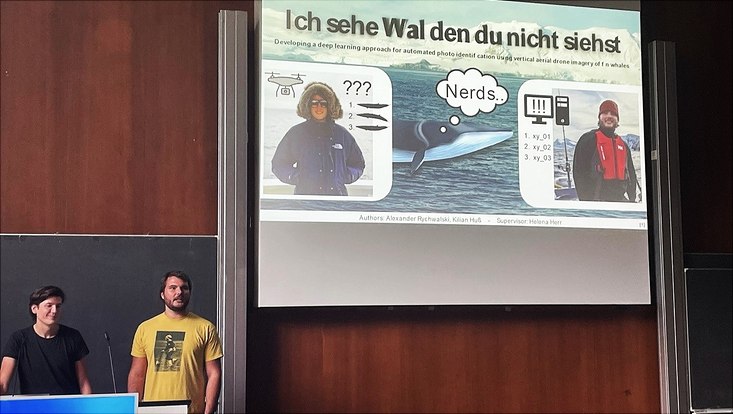Using AI to identify marine mammalsA bird's-eye view on fin whales
31 July 2024, by Miriam Frieß

Photo: Helena Herr/IMF/UHH
The Master’s students Alexander Rychwalski and Kilian Huß have devised an innovative approach to whale research – and won €10,000 for their idea.
Photographic identification, or PhotoID for short, is an important tool for investigating whale populations. In the case of the fin whale, pictures of their dorsal fins are compared to discriminate between individual animals, making it possible to measure and track their population sizes and migratory behavior. But comparing them with the naked eye is both tiresome and time-consuming. Attempts at automatic whale identification, e.g. with the aid of artificial intelligence, have been around for years; however, to date they have been based on side views of the dorsal fin. As a result, some animals can’t be recognized when photographed from different angles.
That’s where the idea pioneered by Alexander Rychwalski and Kilian Huß, and which they presented at a Science Slam early this July, comes into play: the two students hope to develop a system for identifying fin whales using drone videos – that is, images taken from a bird’s-eye view. To automatically identify individual whales, they plan to use an AI program originally designed for facial recognition, modifying it to recognize telltale pigmentation patterns on the whales’ backs. This method allows information on whale populations to quickly and easily be gathered for whale protection and research purposes.
“The idea of using AI to identify and catalogue individual fin whales from drone videos could represent an invaluable contribution to the evolution of the PhotoID approach,” says Dr. Helena Herr, the two students’ mentor. At the CEN, her research focuses on how fin whale stocks are recovering from past whaling. She presented the project proposal to the Scientific Committee of the International Whaling Commission last May, where it met with considerable interest – making the whale expert all the more excited to see the project outcomes. Beyond Rychwalski and Huß, six other groups received funding for their impressive Science Slams. The two students are proud of their victory and happy about the prize money, which they plan to use to take whale monitoring to a new level.
More Information
The competition and funding is organised by Universität Hamburg's 'Digital and Data Literacy in Teaching Lab'. The project promotes students' digital literacy and skills in the handling of data and supports lecturers in further developing their digital didactic skills.


